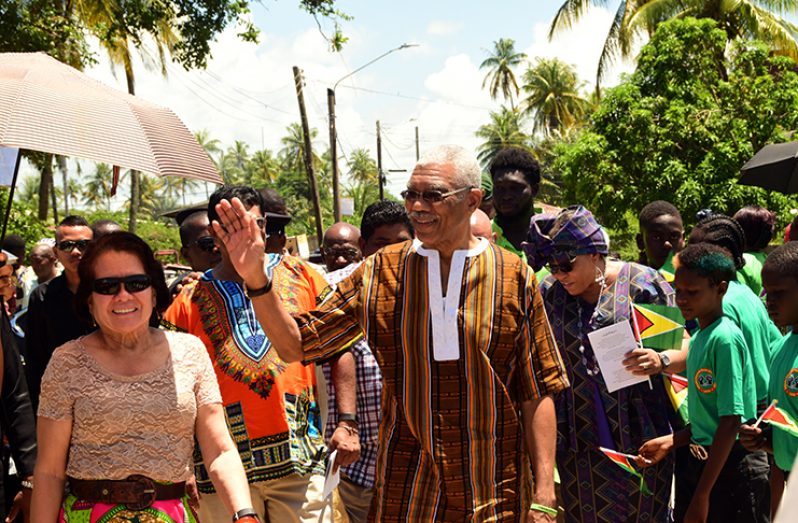…President challenges Guyanese to prepare for petroleum state
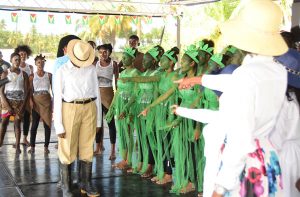
PRESIDENT David Granger said Guyanese must prepare for the impending petroleum state, warning that “if we are not careful, we will lose the advantage that God has given us, a blessed resource, which should not be allowed to fall into the hands of foreigners…”
The Guyanese leader was at the time addressing a large gathering at an Emancipation programme held at Union, Corentyne. The President pointed to the prospects of being a petroleum state and the numerous benefits that not only the current generation will gain from, but many future generations. He however cautioned that without preparation and education, all can be lost. He said education is the key to avoid what he deemed as the four horsemen of the Guyanese apocalypse: ignorance, poverty disease and crime. “So What I am proposing today apart from the cultural presentation is that we Guyanese accept that we have to move from social emancipation to economic emancipation and it comes back to education. My dear brothers and sisters, we have to prepare the next generation for this new economy, we have to stop and start thinking about the future, we have to start thinking about the type of education, scientific and technical education, so that Guyanese can compete with other petroleum- producing countries. The future is bright, but if we as a nation and people are not careful, we will lose the advantage that God has given us, a blessed resource, which should not be allowed to fall into the hands of foreigners and we must be able to produce fully qualified people…we must educate our sons and daughters to take over, so that future generations can inherit something better than what the current generation inherited from our foreparents.”
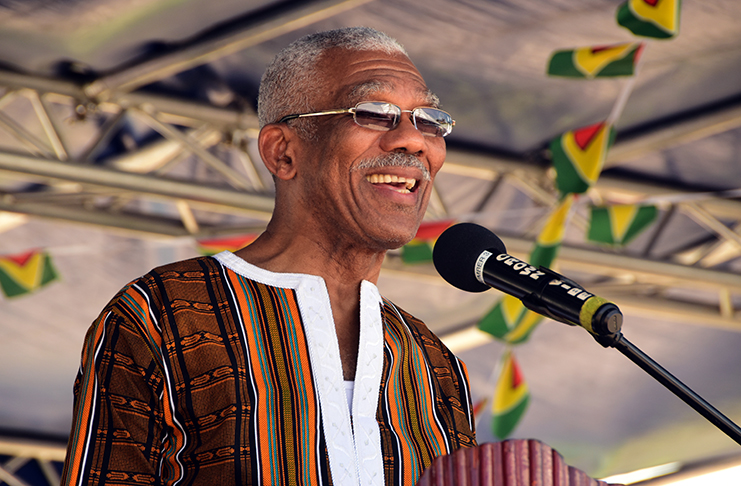
The President left a three-point message to all that will serve as the foundation for ensuring a bright future for all: achieve economic emancipation through education, seek employment in your villages and towns to get out of poverty and becoming entrepreneurs by seizing opportunities when they arrive. “When the drumming stops and the dancers are tired and we have to face the future and for me and I am sure for you the future is bright, all of us man woman and child and for generations to come can look forward to the good life in the Cooperative Republic of Guyana.”
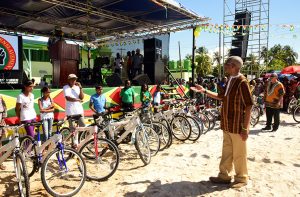
Meanwhile, giving a history lesson on village movement and the significance of Emancipation, President Granger said: “One hundred and eighty(180) years ago, our foreparents succeeded after centuries of sacrifice and struggles to win legal emancipation. Today 2018, we the heirs of descendants must still struggle to secure economic emancipation.”
The President, a historian, reflected on the history of the struggles and ultimate triumph of the Africans and how through unity they were able to transform Guyana. “This is the most auspicious event in Guyanese history; it is a day of deliverance from the worst crime on humanity — 200 years of enslavement. It was a day of departure from the plantations, the degradation and the decimation on the plantation, but it is also a day of determination when 80,000 slaves decided they will never be slaves again. That they wanted better lives for themselves, their womenfolk and their children, but it was also a day of demographic change for the whole country. After the 1st of August Guyana was never the same again. This is the most important demographic event; this is a time when our people came together. It was transformative, it was revolutionary, nothing like that happened before and it won’t happen again.”
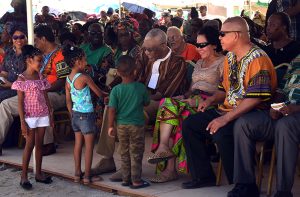
He continued that through the abolition of slavery, 6000 hectares of land was bought from savings, including that of #53 Village that helped to start the village movement that not only allowed Africans, but all other races to go into the villages and live in unity as Guyanese. “Number 53 was one of the oldest and boldest that was part of the village movement and the villages are important even today, because the villages are the cradle of the nation. People of all ethnic groups live in villages. We have to understand and respect villages and the roles they play historically and the roles they will have to play in the future. When these villages were formed they were not haphazard, they were carefully planned by people who couldn’t read or write. These people had a vision, a sense of mission, a sense of purpose to establish these four villages on four pillars Home, Church, School and Farm.”
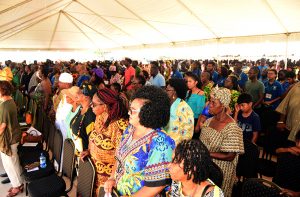
The President said that The village movement and the four pillars helped to form a new society and helped to make the country a better place for all and urged that the village movement and the four pillars be used to preserve and protect the country. To this end, he pointed to his declaration of November 7th as National Day of Villages as he recognised the role villages played and will continue to play in the transformation of lives and the nation.
Earlier, the village of Union came alive as the Berbice Association of African Groups pulled out all the stops as they put together a spectacular cultural programme laced with songs, dances, fashion and drumming in addition to having on display food, craft and African literature that left everyone spellbound, including the President, who remarked “this was the most exciting cultural presentation I have ever witnessed.”
Also gracing the event were several senior members of the government and regional
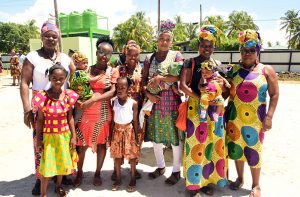
administration officials including Vice-president and Minister of Public Security, Khemraj Ramjattan; Minister of Social Cohesion, Dr. George Norton; Minister of Public Health, Volda Lawerence; Minister of Social Protection, Amna Ally; Minister of Education, Nicolette Henry; and Regional Chairman David Armogan, among others.






